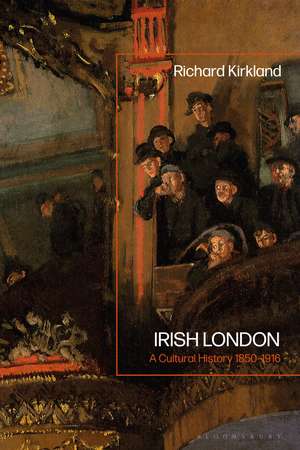Irish London: A Cultural History 1850-1916
Autor Prof Richard Kirklanden Limba Engleză Paperback – 22 mar 2023
| Toate formatele și edițiile | Preț | Express |
|---|---|---|
| Paperback (1) | 191.22 lei 43-57 zile | |
| Bloomsbury Publishing – 22 mar 2023 | 191.22 lei 43-57 zile | |
| Hardback (1) | 568.87 lei 43-57 zile | |
| Bloomsbury Publishing – 8 sep 2021 | 568.87 lei 43-57 zile |
Preț: 191.22 lei
Preț vechi: 249.30 lei
-23% Nou
Puncte Express: 287
Preț estimativ în valută:
36.59€ • 38.30$ • 30.45£
36.59€ • 38.30$ • 30.45£
Carte tipărită la comandă
Livrare economică 31 martie-14 aprilie
Preluare comenzi: 021 569.72.76
Specificații
ISBN-13: 9781350230057
ISBN-10: 1350230057
Pagini: 232
Dimensiuni: 156 x 234 x 25 mm
Greutate: 0.33 kg
Editura: Bloomsbury Publishing
Colecția Bloomsbury Academic
Locul publicării:London, United Kingdom
ISBN-10: 1350230057
Pagini: 232
Dimensiuni: 156 x 234 x 25 mm
Greutate: 0.33 kg
Editura: Bloomsbury Publishing
Colecția Bloomsbury Academic
Locul publicării:London, United Kingdom
Caracteristici
Contributes to a wide range of fields from Irish history, cultural history, urban history, migration history, Irish studies and Irish literature.
Notă biografică
Richard Kirkland is Professor of Irish Literature at King's College London, UK.
Cuprins
List of IllustrationsAcknowledgementsIntroduction: 'That Great and Terrible City'1. 'Nature Intended Paddy for a Rural Existence': The St Giles Rookery and its Afterlives2. 'A Secret, Melodramatic Sort of Conspiracy': Fenian Violence and the Dynamite War3. Hibernia Exhibited: Irish London on Display4. 'Those Tumultuous Days': London's Irish Cultural Revival 5. ''Ria's on the Job': Irish Popular Performance in London6. 'An Irish Colony in the Midst of the Strangers': The Road to 1916Epilogue: The Slow Martyrdom of Dora Sigerson BibliographyIndex
Recenzii
[A] wonderful new book. a very relevant and also timely reminder of Irish London's heritage. An important book reminding of us of our deep connections with London well before the great exodus of Irish to the city in the 1940s and 1950s.
Irish London introduces us to the costermongers, flower sellers, beggars, artists, criminals, Fenians, poets, lawyers, journalists and civil servants whose lives were woven into the texture of a world city in the making. The complex cultural identities of this compelling, divided and uncertain grouping are brought to life by Richard Kirkland's careful research and his fine, thoughtful writing.
For too long the historical role of the Irish in London has remained frustratingly elusive and under-appreciated. Through exhaustive and astutely targeted research, Kirkland has raised the veil on this hidden community and achieved profound insights into their cultural and political significance at a crucial period in Anglo-Irish relations.
Richard Kirkland's Irish London is a brilliant, nuanced and deeply-informed cultural history of the Irish in London and of London's role in the cultural imaginary of Ireland. Attentive to the complexities of emigration, exile, language, class, and attachment, it will profoundly alter our understanding of the Irish in London.
Irish London introduces us to the costermongers, flower sellers, beggars, artists, criminals, Fenians, poets, lawyers, journalists and civil servants whose lives were woven into the texture of a world city in the making. The complex cultural identities of this compelling, divided and uncertain grouping are brought to life by Richard Kirkland's careful research and his fine, thoughtful writing.
For too long the historical role of the Irish in London has remained frustratingly elusive and under-appreciated. Through exhaustive and astutely targeted research, Kirkland has raised the veil on this hidden community and achieved profound insights into their cultural and political significance at a crucial period in Anglo-Irish relations.
Richard Kirkland's Irish London is a brilliant, nuanced and deeply-informed cultural history of the Irish in London and of London's role in the cultural imaginary of Ireland. Attentive to the complexities of emigration, exile, language, class, and attachment, it will profoundly alter our understanding of the Irish in London.
